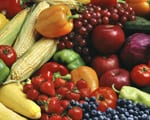Le Journal de la Science: And if eating organic was indeed better for your health?
Science journalist Alain Tranet writing in the Paris-based science publication Le Journal de la Science has covered research carried out in the fruit fly lab of SMU biologist Johannes H. Bauer by Plano, Texas, high school student Ria Chhabra. The article, “Et si manger bio était bel et bien meilleur pour la santé?,” published April 3.
Bauer, an assistant professor in SMU’s Department of Biological Sciences, mentored Chhabra in her research to examine whether there would be health differences to fruit flies fed an organic diet or a nonorganic diet. Chhabra’s study found that flies fed an organic diet fared better on important health tests, particularly fertility and longevity.
Read the article in French. An English translation follows the French excerpt below.
EXCERPT:
By Alain Tranet
Le Journal de la Science
Manger bio serait-il en définitive meilleur pour la santé ? C’est en tout cas ce que suggère une étude américaine menée… sur la mouche du vinaigre. Un résultat qui contredit plusieurs précédents travaux.Manger bio a-t-il un effet bénéfique sur la santé humaine ? Alors que ce débat fait rage depuis de nombreuses années maintenant, une nouvelle étude menée sur la drosophile met en lumière l’existence d’une influence positive de l’alimentation biologique sur la santé de cette mouche (laquelle est, rappellons-le, un modèle animal abondamment utilisé par les scientifiques pour toutes sortes d’expérimentation, et notamment celles portant sur les mécanismes cellulaires du vieillissement). Ce résultat a été publié par des biologistes américains de la Southern Methodist University (Dallas, États-Unis) dans la revue en accès ouvert PLoS One, sous le titre “Organically Grown Food Provides Health Benefits to Drosophila melanogaster”.
Quelle est la nature exacte du résultat obtenu par le biologiste Johannes H. Bauer et ses collègues ? Ils ont constaté que des mouches drosophiles nourries durant toute leur (courte) existence avec des aliments issus de l’agriculture biologique présentaient une longévité accrue et une plus grande fertilité par rapport à des drosophiles nourries avec des produits issus de l’agriculture conventionnelle.
Plus précisément, les scientifiques ont testé les effets sur la santé de quatre produits issus de l’agriculture biologique : des pommes de terre, du raisin des bananes et du soja. Pour évaluer les effets séparés de ces quatre aliments, quatre groupes de 200 drosophiles ont été constitués, recevant chacun l’un ou l’autre de ces produits durant l’intégralité de leur vie, ainsi que quatre groupes contrôle constitués de 200 drosophiles recevant également durant toute leur existence l’équivalent non biologique de l’un ou l’autre de ces quatre aliments.
TRANSLATION:
Is eating organic ultimately better for our health? That’s what a new U.S. study suggests … for the fruit fly. The result contradicts several previous studies.Does eating organic have a beneficial effect on human health? While this debate has been raging for many years now, a new study on Drosophila highlights the existence of a positive effect of organic food on the health of the fly (which is, remember, an animal model widely used by scientists for all kinds of experiments, including those on the cellular mechanisms of aging). This result was published by American biologists from Southern Methodist University (Dallas, USA) in the open access journal PLoS One, titled “Organically Grown Food Provides Health Benefits to Drosophila melanogaster.”
What is the exact nature of the result obtained by the biologist Johannes H. Bauer and his colleagues? They found that fruit flies fed throughout their (short) life with organically grown food had increased longevity and higher fertility compared to fruit flies fed with products from conventional farming.
Specifically, the scientists tested the effects on health of four kinds of produce from organic farming: potatoes, grapes, bananas and soybeans. To assess the separate effects of these four foods, 200 fruit flies were sorted into four groups, each receiving either of these products during their entire life, and four control groups consisting of 200 Drosophila also receiving an equivalent non-organic diet.
Follow SMUResearch.com on Twitter.
For more information, www.smuresearch.com.
SMU is a nationally ranked private university in Dallas founded 100 years ago. Today, SMU enrolls nearly 11,000 students who benefit from the academic opportunities and international reach of seven degree-granting schools. For more information see www.smu.edu.
SMU has an uplink facility located on campus for live TV, radio, or online interviews. To speak with an SMU expert or book an SMU guest in the studio, call SMU News & Communications at 214-768-7650.



 Fruit flies fed organic diets are healthier than flies fed nonorganic diets, study finds
Fruit flies fed organic diets are healthier than flies fed nonorganic diets, study finds Center for Creative Leadership to study innovative learning method of SMU Lyle School of Engineering
Center for Creative Leadership to study innovative learning method of SMU Lyle School of Engineering Parenting program tackles child abuse and neglect among formerly homeless families
Parenting program tackles child abuse and neglect among formerly homeless families White dwarf supernovae are discovered in Virgo Cluster galaxy and in sky area “anonymous”
White dwarf supernovae are discovered in Virgo Cluster galaxy and in sky area “anonymous” Hiding in plain sight: How invisibility saved New Mexico’s Jicarilla Apache
Hiding in plain sight: How invisibility saved New Mexico’s Jicarilla Apache Study: Most Texas ISDs that are teaching the Bible are skirting 2007 state law
Study: Most Texas ISDs that are teaching the Bible are skirting 2007 state law